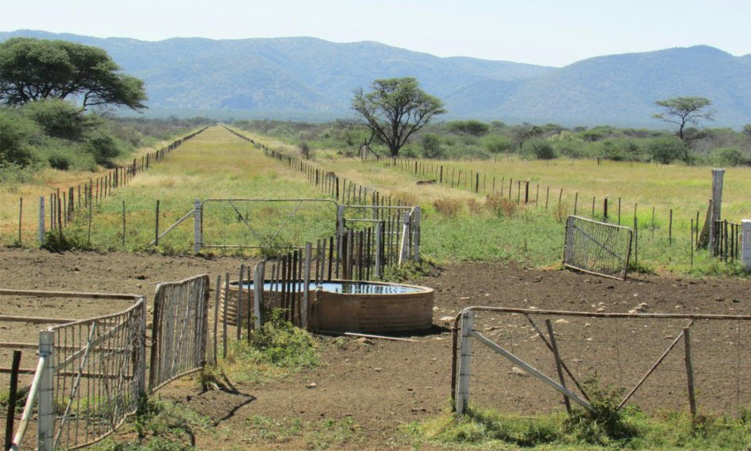Namibia’s land resettlement programme has been criticised for its snail’s pace in redressing land imbalances.
The government has spent N$ 2,5 billion since the inception of the land resettlement programme 34 years ago, resettling 5 490 farmers from previously disadvantaged communities in the process.
The delays in many Namibians accessing farm land has now seen Rally for Democracy and Progress (RDP) and former lawmaker Mike Kavekotora calling for structural reform of the model used to acquire and redistribute land.
Ministry of Agriculture, Water and Land Reform spokesperson Jona Musheko told The Namibian this week that the government has spent over N$2,5 billion to acquire farm land from largely white commercial farms, acquiring 3,5 million hectares of farmland under the willing seller, willing buyer model.

This model is based on willing landlords selling land to the government at market related prices and the state resettling people from previously disadvantaged communities on the land.
“The government created the ministry responsible for land reform in 1990, in response to the unequal and unjustifiable land distribution situation in the country, to be the custodian of state land and to facilitate a state-led land reform. The aim of the programme is not only to correct past colonial wrongs, but also to achieve social and economic equity for all its citizens,” said Musheko.
The central objectives are to bring about a more equitable distribution of and access to land, among others, he added.
The first national conference on land reform was held in 1991 as a forum for presenting and discussing relevant land issues and grievances, as well as to develop a national policy and programme of action to solve land problems, Musheko added.
FAIR DISTRIBUTION
Musheko said land distribution has so far benefited Namibians from all walks of life.
“Group resettlement projects, San Development Projects and cooperatives form part of the total figure of 5 495 beneficiaries. The gender of approximately 1 748 beneficiaries cannot be accounted for by the ministry, due to the fact that most beneficiaries are on group resettlement projects/farms.”
Some beneficiaries are on old farms under the administration of the Division of the Marginalised Communities, which only counts households and not individuals. Thus, the number of farms differ from the number of farms purchased because some farms are consolidated as per the demarcation plans to accommodate more beneficiaries, Musheko said.
SHRINKING BUDGET
Criticism over the country’s land resettlement programme is increasing after land reform minister Calle Schlettwein told parliament last week land resettlement is a daunting task due to dwindling funds allocated to the ministry.
He said the budget meant for farm land acquisition has decreased from N$100 million to N$50 million in the current budget framework.
POLITICIANS SPEAK

Kavekotora yesterday said the resettlement programme was a constitutional failure.
“The Constitution, as constructed, failed miserably to address the land issue and gave rights to those who are not the rightful landowners. Colonial wars waged in Namibia resulted in mass possession of land by the colonisers, a situation left deliberately structured and incorporated by the five Western powers to benefit the white minority.
“The fault does not lie with the willing seller, willing buyer model, but has got everything to do with the policy pronouncements and the implementation thereof. The system is being abused, both by the government and the sellers, due to a lack of quantifiable and qualifiable policy directives. It’s prone to abuse.”
He said the model managed to settle some Namibians but failed to resettle those that lost land, due to the dubious criteria used.
“The price for land in Namibia has become uneconomical even for the government to acquire sizeable land for settlement, let alone private previously disadvantaged buyers. We need a constitutional amendment to attain the desired level of satisfaction on the land issue.
He said the struggle for independence for those who lost land will be fruitless and meaningless until serious efforts are initiated to address the land issue to the benefit of all.
He argued that “serious discussion on the land issue has been deliberately shelved because facing this land issue head on might result in unwanted consequences”.
“It’s time to face reality and move away from addressing the land question based on the benefit leaders accrue from a particular segment of our community, either politically or economically. That approach is short-sighted and is doomed to fail in the long run.”

Meanwhile, the South West Africa National Union (Swanu) splinter group president Evalistus Karonda says the model has failed hopelessly.
“It will not (succeed) because it was never designed to deliver the much needed land for productive agricultural purposes.”
Karonda said top government leaders like the “current prime minister and her husband are land owners and in the business of milking the government dry with exorbitant land prices”.
“The white landowners have the black leading elite on their side as the gatekeepers of their wealth, property and capital interests.
“It must be replaced with a more aggressive approach such as expropriation without compensation in respect of the natural land.
Compensation must only be limited to the improvements made on the land. The state must take ownership of all land, both urban and rural,” Karonda said.
Popular Democratic Movement (PDM) lawmaker Inna Hengari said the model has had some successes but did not “sufficiently address historical injustices”.
She said more proactive measures are needed to achieve meaningful land reform and to return land taken from indigenous communities during colonial rule to its rightful owners or descendants.
“Our land reform policies still very much lack a sense of appreciation of our country’s history and atrocities perpetrated against our people. Without land, there can be no real economic emancipation.
“It’s imperative for Namibians to demand more substantial measures that directly confront the historical injustices of land distribution and prioritise the needs of marginalised communities.”
ANALYSTS VIEWS

Political analyst Ndumba Kamwanyah said the land resettlement policy has failed at many levels.
He said he is concerned about why the government keeps implementing a policy that is failing the country in terms of land distribution.
“I think it is time that this policy be reviewed. I don’t even want to think of reforming it. We should come up with something more robust to address the land allocations issues in the country.”
Kamwanyah said the problem is due to the nature of the policy being based on willingness to buy or sell.
Kamwanyah further said people who are being resettled are left to pick up the pace of developing those lands.
“We need to review the list in order to see who was resettled. The people that really need to be resettled are not resettled but we have resettled the elites and politicians. Those are some of the issues that we have to speak about this policy,” he said.
“The training, the speed in terms of the slowness of implementing it, monitoring and evaluation of the policy and its nature make it a failed policy,” Kamwanyah said.
Political scientist Rui Tyitende says the genesis of Namibia’s spectacular failure on land reform can be traced back to the constitutional principles of 1982, when Western powers and the architects and beneficiaries of apartheid made sure that the land they stole during their occupation years remained theirs for the foreseeable future.
“The willing seller, willing buyer principle is a concept that was intentionally designed to protect white interests. It is quite simple, if there is no seller, there is no land to buy. And if they do sell, it’s at exorbitant prices that will ultimately bankrupt the state should serious land reform occur.
“A damning report by Swapo on the state of governance in the country at the their third national policy conference in June 2022 admitted that fat cats have used their positions to gain control over large farms and directed government subsidised inputs to these farms, including those in communal rural areas (fencing off), alienating many rural communities. More importantly, the government has been reluctant to release the master list of beneficiaries, arguing that it will stoke ‘tribalism’. What are we to deduce from that statement? The problem regarding land reform is that we have black leaders that are tolerant of black suffering,” said Tyitende.
SIDELINED
Land activist Benedick Louw says a study by the Namibia Statistics Agency (NSA) in 2018 indicates that previously disadvantaged Namibians have been left on the sidelines.
“The NSA, based on empirical evidence and not rumour mongering or political posturing, in the introduction to the booklet titled ‘Namibia Land Statistics’, released in September 2018, remains very clear: “In terms of freehold agricultural land, which constitutes 39,7 million hectares of the country, previously advantaged farmers own 27,9 million hectares (70%), while the previously disadvantaged community own 6,4 million hectares (16%). The government owns only 5,4 million hectares (14%). Females only own 23% of the freehold agricultural land, while the remaining 77% is owned by males.
“Not only are these land ownership patterns gravely skewed racially but indicates sex biases privileging the white male overwhelmingly,” he said in writing to The Namibian.
Louw asserted that the land situation has deteriorated since independence.
“There exists no tangible premise to begin to base our satisfaction upon, based on the stagnant progress of land redistribution in Namibia. Diametrically opposed progress has been made as far as it concerns the land question.
“There was no !noabates or Hileni in Keetmanshoop, a DRC in Swakopmund, a Kanaan in Gobabis or Ombili in Windhoek prior to independence in 1990, all of which are informal settlements also known as concentration camps, which currently house more than one million inhabitants, which could be worse pending the disintegration of the 2023 NSA stats,” he argued.
Like Karonda, Louw argued for land expropriation without compensation.
“It’s imperative to amend the Namibian Constitution to make it legally possible to expropriate land without compensation to be able to address historical injustices of land dispossession, which continues to have significant repercussions on the social, political and economic character of this country, wherein which the further exploitation of blacks and the sustenance of white domination continue unabated 34 years post-independence,” Louw said.
Stay informed with The Namibian – your source for credible journalism. Get in-depth reporting and opinions for
only N$85 a month. Invest in journalism, invest in democracy –
Subscribe Now!







